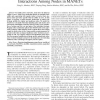Free Online Productivity Tools
i2Speak
i2Symbol
i2OCR
iTex2Img
iWeb2Print
iWeb2Shot
i2Type
iPdf2Split
iPdf2Merge
i2Bopomofo
i2Arabic
i2Style
i2Image
i2PDF
iLatex2Rtf
Sci2ools
157
click to vote
TSMC
2010
2010
Attack and Flee: Game-Theory-Based Analysis on Interactions Among Nodes in MANETs
In mobile ad hoc networks, nodes have the inherent ability to move. Aside from conducting attacks to maximize their utility and cooperating with regular nodes to deceive them, malicious nodes get better payoffs with the ability to move. In this paper, we propose a game theoretic framework to analyze the strategy profiles for regular and malicious nodes. We model the situation as a dynamic Bayesian signaling game and analyze and present the underlining connection between nodes' best combination of actions and the cost and gain of the individual strategy. Regular nodes consistently update their beliefs based on the opponents' behavior, while malicious nodes evaluate their risk of being caught to decide when to flee. Some possible countermeasures for regular nodes that can impact malicious nodes' decisions are presented as well. An extensive analysis and simulation study shows that the proposed equilibrium strategy profile outperforms other pure or mixed strategies and prov...
| Added | 22 May 2011 |
| Updated | 22 May 2011 |
| Type | Journal |
| Year | 2010 |
| Where | TSMC |
| Authors | Feng Li, Yinying Yang, Jie Wu |
Comments (0)

